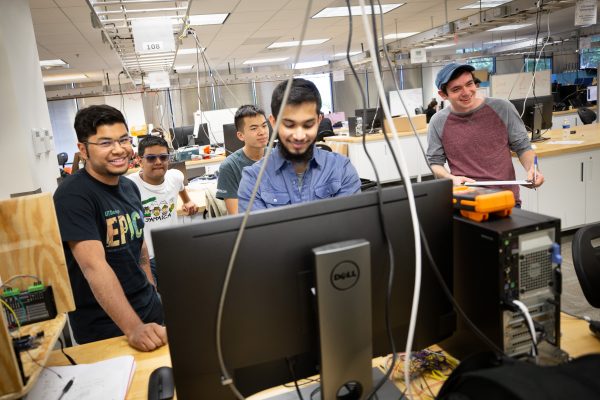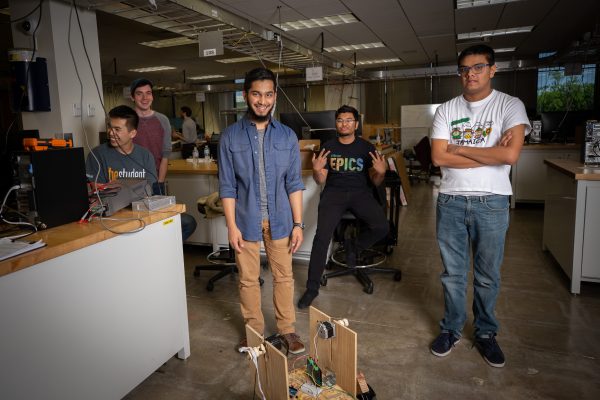During the AMC drama Mad Men, fictional character Don Draper says: “If you don’t like what’s being said, then change the conversation.”
That’s exactly what happened in December of 2016, when Margaret Scholl announced that she would start a mobility ministry—Early Wheels—to improve the lives of children with disabilities through interactive experiences. Infants and small children with motor disabilities often rely on parents and caregivers to explore their environment. Limitations on discovering their surroundings, as well as the inability to play and interact with others, hinders childhood mental and social development.

By partnering with two Engineering Projects In Community Service (EPICS) teams at UT Dallas, Scholl began to transform the discussion of children’s immobility.
“It’s different from other school projects in the fact that there’s no certain right way to do this.” Abbas Zaki
One of these teams, Comet Wheels, is hard at work to develop a mobile device known as the Hover Buggy. As of late last year, Early Wheels has donated 25 vehicles for children, meanwhile the direction of Comet Wheels has a twist. Previously, mobile devices consisted of ride-on vehicles, such as modified toy vehicles powered by a 12-volt battery. The Hover Buggy, which utilizes a hover board for power, is an attachment currently in development that aims to give children the opportunity to maximize their environment. Due to its smaller size and lightweight construction, as well as advantages in a tighter turning radius, the Hover Buggy is designed for children up to the age of four.
Abbas Zaki, Project Partner Liaison for Comet Wheels shared with us: “Because a lot of the times children with motor disabilities can’t really walk around or explore their environment and that puts them behind other children their age. So that effect kind of lasts along their lifetimes—so what we are doing is basically going to help with that.”
Speaking of changing the conversation, did we mention that the Comet Wheels team were told it couldn’t be done? Because it hasn’t been.

“Some of the challenges we have faced […] is since we’re the first-semester first-team for this project, we’re in the prototype stage,” Jin Chen, Project Manager reveals. “That means we have to try multiple designs.”
Abbas elaborated. “It’s different from other school projects in the fact that there’s no certain right way to do this.”
As the Comet Wheels team discussed several iterations on their project, they gave us insight regarding the depth their endeavor undertakes. Abhilash Bajracharya, Project Leader, opened up about the toy market industry; specifically how recreational products are most often geared toward children who have strength in their upper body.
“The whole purpose of this whole thing is we’re trying to give back to the community… and bring some enjoyment to their [children’s] lives.” Abhilash Bajracharya
“What about the kids who can’t walk on their legs, or kids who can’t pull a lever or maybe someone who has to be stationed in a compartment.”
Abhilash continued with a sentiment the team shared: “Something I wish more people would’ve asked is what’s the purpose behind this robot? Because mainly they see the gears, they see motors, they see the hover board and they’re like, ‘Oh, this is really cool. Can I sit on it? Can I ride it or something?’ The whole purpose of this whole thing is we’re trying to give back to the community… and bring some enjoyment to their [children’s] lives.”
Functionality plays a large part in how these children will be able to interact with their environment. It is important to consider the child’s daily need? Will they require a joystick, will it be efficient for indoor or outdoor use, and is the design safe and practical? There are also financial aspects to consider.
“When people ask me about the project, I just feel this pride—like I want to tell them about this project.” Jin Chen
The cost of pediatric wheelchairs, even those that provide basic mobility options, range from hundreds of dollars to several thousand. Costs increase with added features. By utilizing a hover board, Comet Wheels is able to significantly drive down the cost of ride-on vehicles until the children are able to qualify for Medicaid.
Not only has the conversation changed, but the experience has changed them, as well.
“When people ask me about the project, I just feel this pride—like I want to tell them about this project,” Jin said. “I want to tell them about what we’re doing and who we’re working for.”
Rohan Shrivastsa, Project Financial Officer, felt the same.
“I have to agree with Jin. Whenever people say, ‘So what do you do?’ I can explain to them … this is not just some normal school project. It feels sort of significant because you’re actually making this to help people and that is what makes me feel proud.” He continued: “They say the best thing in the world is a child’s smile. At some point they’re going to make all the effort we’re putting in worthwhile.”
“They say the best thing in the world is a child’s smile. At some point they’re going to make all the effort we’re putting in worthwhile.” Rohan Shrivatsa
For Abbas and Abhilash, the exposure to new aspects of study and partnerships helped them develop as engineers.
“For me personally, the thing that I came across that was kind of unexpected was how much I really enjoyed the actual electronics components,” Abbas shared. “I’m a biomedical engineer, so actually getting to work with the part we know, programming the stepper motors, figuring out how to connect everything, and how to give it commands so that it moves a certain amount, was the most interesting part for me because that’s so far apart from my actual program of study.”
“As an engineer,” Abhilash told us, “I’ve been confined to the classroom and confined to just working—everything is off PowerPoints or off the lecture. But here EPICS really puts you into this environment where you end up collaborating with a project partner. Just this networking, finding people that can help us with this robot, and help us enhance as an engineer—like further ourselves as engineers, but also as people.”

The conversation around wheelchairs and motorized assistance options continues to change, as well as activism to raise awareness for disabilities. From The Accessible Icon Project, Christopher Reeve’s open dialogue with children on Sesame Street and his warm return to the Oscars in the late 90’s, to the more recent opening speech from Prince Harry at the Invictus Games, the abilities of those with disabilities is a powerful talking-point Comet Wheels has honed in on. We are excited to follow up on the changing conversation.
“Since spring 2016 The Jonsson School of Engineering and Computer Science has offered UT Dallas students the opportunity to participate in an innovative service-learning program, UTDesign EPICS, that blends community service, undergraduate education, and engineering design. Multidisciplinary teams of undergraduate students are paired with nonprofit organizations to collaboratively address urgent human, community, and environmental needs with technology-based solutions at no cost to nonprofit organizations. The goal of UTDesign EPICS is to meet a critical educational need by providing a broad set of professional skills and a real understanding of the impact they can have on the community.” – Andrea Turcatti, Program Director

You must be logged in to post a comment.